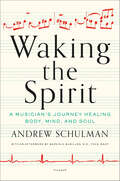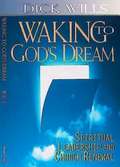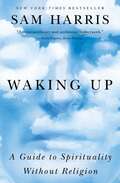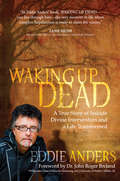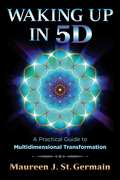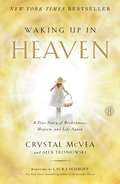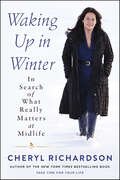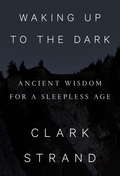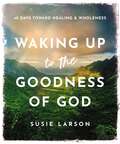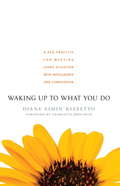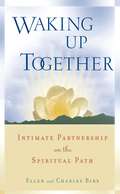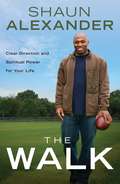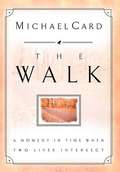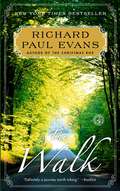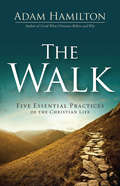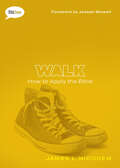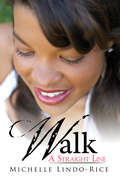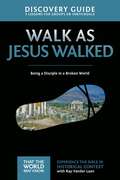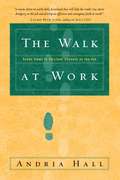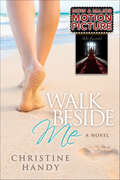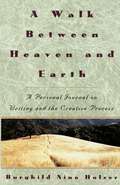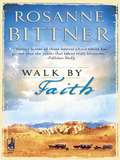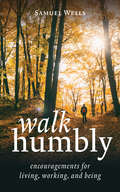- Table View
- List View
Waking the Spirit: A Musician's Journey Healing Body, Mind, and Soul
by Andrew SchulmanAn Oliver Sacks Foundation Best Book of the Year Selection, Finalist for the Books for a Better Life "Best First Book” Award, and a People Magazine Pick in nonfiction.The astounding story of a critically ill musician who is saved by music and returns to the same hospital to help heal othersAndrew Schulman, a fifty-seven-year-old professional guitarist, had a close brush with death on the night of July 16, 2009. Against the odds—and with the help of music—he survived: a medical miracle.Once fully recovered, Andrew resolved to use his musical gifts to help critically ill patients at Mount Sinai Beth Israel’s ICU. In Waking the Spirit, you’ll learn the astonishing stories of the people he’s met along the way—both patients and doctors—and see the incredible role music can play in a modern hospital setting.Schulman expertly weaves cutting-edge research on neuroscience and medicine, as well as what he’s learned as a professional musician, to explore the power of music to heal the body and awaken the spirit.
Waking to God's Dream: Spiritual Leadership and Church Renewal
by Richard WillsThe demands of congregational ministry are many, the rewards sometimes seem few, and burnout becomes a real possibility. Small wonder, then, that churches become stuck in a state of arrested spiritual development. When the pastor is functioning in a survival or maintenance mode, the church's vitality is often the first casualty. Yet Wills's own experience demonstrates that churches can turn around; the wind of the Spirit can be felt anew. This happens when the congregation is infected by the vision of what God is doing in their midst--a vision which the leaders, particularly the pastor, must bring before them. In Waking to God's Dream, Richard Wills shares the spiritual disciplines and insights which he believes account for the transformation of the congregation he serves from a large church in decline to one that is growing and reaching out to its community in a variety of creative ministries. Detailing the steps and initiatives that led to this turnaround, Wills demonstrates how personal commitment on the part of the congregation's leaders and ministers have been the key to the work they have accomplished.
Waking Up: A Guide to Spirituality Without Religion
by Sam HarrisFor the millions of Americans who want spirituality without religion, Sam Harris's new book is a guide to meditation as a rational spiritual practice informed by neuroscience and psychology.<P> From multiple New York Times bestselling author, neuroscientist, and "new atheist" Sam Harris, Waking Up is for the 30 percent of Americans who follow no religion, but who suspect that Jesus, Buddha, Lao Tzu, Rumi, and the other saints and sages of history could not have all been epileptics, schizophrenics, or frauds. Throughout the book, Harris argues that there are important truths to be found in the experiences of such contemplatives--and, therefore, that there is more to understanding reality than science and secular culture generally allow. <P> Waking Up is part seeker's memoir and part exploration of the scientific underpinnings of spirituality. No other book marries contemplative wisdom and modern science in this way, and no author other than Sam Harris--a scientist, philosopher, and famous skeptic--could write it.
Waking Up Dead: A True Story of Suicide, Divine Intervention and a Life Transformed
by Eddie AndersWaking Up Dead is the true story of suicide, divine intervention and a life transformed. A true accounting directly from author and songwriter, Eddie Anders on what he calls his dark night of the soul when life seemed too hard to continue any longer, even though from the outside, it looked as if he had it all. This is more than a memoir and readers are sure to be hooked as he shares in detail all he’s learned over a decade concerning what led him to self-destruction and the process of overcoming depression. Written with the goal and hope to rescue as many people as possible from drowning in depression and potential suicide, Waking Up Dead is a powerful read certain to leave audiences moved and aware.
Waking Up in 5D: A Practical Guide to Multidimensional Transformation
by Maureen J. St. GermainTools and teachings to guide you in the transition from the polarized mindset of the 3rd dimension to the joy and love of 5th dimensional vibrations • Explains how to recognize the 5D experiences you’ve already had, identify the differences between 3D linear thinking and 5D multidimensional thinking, and turn 3D viewpoints around to expand your perception of what is possible • Includes exercises to protect your energies, especially while sleeping, and Sacred Geometry meditations to open yourself to higher frequencies • Reveals how to develop a Higher Self connection, increase your sensitivity to dimensional signatures, and consciously choose 5D, where love is the governing force We are all transitioning from the narrowly-focused and polarized awareness of the Third Dimension and waking up to the higher vibrations and abilities of the Fifth Dimension. Each of us has already experienced 5D: Think about your most memorable and uplifting experiences of the recent past--where everything went well, interactions were harmonious and loving, and all felt blissful and happy--that’s 5D. For some, the shift is sudden and permanent, but for many of us, the change is gradual, coming in fleeting moments and waves. In this ascension manual, spiritual teacher Maureen J. St. Germain explains how to shift your energetic patterns and choose to permanently anchor yourself in the joy, love, and kindness of 5D. Guiding you through the opportunities the Fifth Dimension has to offer, the author reveals how to develop a Higher Self connection, increase your sensitivity to dimensional signatures, and consciously choose 5D, where love is the governing force. She shows how 5D relates to 3D as well as to 4D, the transitional dimension between the two, and explains how to read the energy patterns that distinguish one dimension from the next as well as how to experience multiple dimensions simultaneously. She explores how to identify the differences between “good vs. evil” polarized 3D linear thinking and dynamic 5D multidimensional thinking and how to turn 3D viewpoints around to expand your perception of what is possible. Offering eye-opening stories of 5D experiences from students and inspiring information from her spirit guides, the author also details exercises to protect your energies, especially while sleeping, and provides Sacred Geometry meditations to activate your 8th chakra and open yourself to higher frequencies. She also explores how awakening to 5D allows you to form a strong bond to global consciousness, so your personal transformations will have a more profound impact on the people in your circle, and beyond.
Waking Up in Heaven: A True Story of Brokenness, Heaven, and Life Again
by Crystal McVea Alex TresniowskiNew York Times bestseller! A remarkable and inspirational memoir about one woman's near-death experience, who was dramatically changed by the nine minutes she spent in heaven.On December 10, 2009, McVea, a thirty-two-year-old mother of four, went to the hospital for a routine procedure. While undergoing treatment, her face suddenly turned a dark shade of blue, then black. Her mother screamed for help, and a nurse tried to revive her…to no avail. Today, Crystal does not remember what happened in that hospital room during the nine minutes she was unconscious and unable to breathe on her own. She has no memory of the panic and the rushing nurses and the loud cries of &“Code Blue.&” She only remembers drifting off…and waking up in heaven. This unexpected meeting of a self-described sinner and skeptic with her God changed everything. Raised Christian, she had left her faith behind after childhood abuse and the subsequent struggles and suffering of her troubled teens and early adulthood. She longed to believe but felt abandoned, broken, and undeserving. A moving autobiographical testament to the power of divine love and forgiveness, Waking Up in Heaven shares the message of hope, healing, and compassion McVea brought back from her brush with God. This brave, honest account of years lost to shame and guilt will inspire those who&’ve stumbled along their own spiritual journey, with the uplifting reminder that no one is beyond the reach of grace and redemption, and that, in the words of the author, &“God is real. Heaven is real. And God&’s love for us is the realest thing of all.&”
Waking Up in Winter: In Search of What Really Matters at Midlife
by Cheryl RichardsonInternationally recognized coach and New York Times bestselling author Cheryl Richardson has toured the world empowering others to make lasting change. But when Richardson’s own life no longer worked as it once had, a persistent, inner voice offered unmistakable guidance: it was time to reevaluate her life to uncover what really mattered.Waking Up in Winter is the candid and revelatory account of how at midlife, Richardson found renewed contentment and purpose through a heroic, inward journey. The unfolding story, told through intimate journal entries, follows Richardson from the first, gentle nudges of change to a thoughtfully reimagined life – a soulful, spring awakening.With an experienced coach’s intuition and an artist’s eye, Richardson reexamines everything – her marriage, her work, her friendships, and her priorities – gracefully shedding parts of the self that no longer serve along the way. In the end, she not only discovers what really matters at midlife, she invites readers to join her in the inquiry process by providing thought-provoking questions designed to usher them through their own season of transformation. Offering up Richardson’s most powerful teaching tool yet – her own life – Waking Up in Winter takes readers on a brave, spiritual adventure that shows us all how to live a more authentic and meaningful life.
Waking Up to the Dark: Ancient Wisdom for a Sleepless Age
by Clark Strand Will LytleIn the tradition of Thomas Merton's spiritual classic. The Seven Storey Mountain or Thomas Moore's Care of the Soul, Waking Up to the Dark is a deeply resonant and personal project--a modern gospel that is an investigation of the relationship between darkness and the soul. The darkness Clark Strand is talking about here is literal: the darkness of the nighttime, of a world before electricity, when there was a rhythm to life that followed the sun's rising and setting. Strand here offers penetrating insight into the spiritual enrichment that can be found when we pull the plug on our billion-watt culture. He argues that the insomnia so many of us experience as "the Hour of the Wolf" is really "the Hour of God"--a wellspring of rest and renewal, and an ancient reservoir of ancestral wisdom and inspiration. And in a powerful yet surprising turn, he shares with us an urgent message for the world, received through a mysterious young woman, about the changes we all know are coming. Waking Up to the Dark is a book for those of us who awaken in the night and don't know why we can't get back to sleep, and a book for those of us who have grown uncomfortable in real darkness--which we so rarely experience these days, since our first impulse is always to turn on the light. Most of all, it is a book for those of us who wonder about our souls: When the lights are always on, when there is always noise around us, do our souls have the nourishment they need in which to grow?
Waking Up to the Goodness of God: 40 Days Toward Healing and Wholeness
by Susie LarsonFor those who have been disappointed when the "good life" let them down or discouraged by life's struggles, the goodness of God is trustworthy, life-giving, and everlasting. Jesus wants to lead you on a healing path to redeem your story and to make you whole.The words we say and the things we pray matter to God and to our health. Where we rest our gaze and how we think about God directly impacts the condition of our souls. Proverbs 14:30 states, "A heart at peace gives life to the body." God is well able to restore and renew us even when culture swirls around us. The world needs healing. But we can't impart what we don't possess. Scripture highlights the significance of 40 days as a kind of pilgrimage or spiritual journey toward a deeper dependence and reliance upon God. Science highlights how 40 days of practice (of a habit, a renewed thought, a healthy discipline, etc.) directly impacts our brain's structure and physiological health.Join best-selling author, popular radio host, and Bible teacher Susie Larson on a 40-day pilgrimage to explore God's invitation to flourish, heal, and know His peace in a way that changes us forever. Through this journey, readers will discover how to:Retrain their brains and renew their minds to notice God's goodness and to make that their default settingRevive their faith by immersing in God&’s promises, saying and praying them more than everRestore a right view of God's character based on His Word and stop drawing wrong conclusions about HimRedeem their story and renew their strength by following the Healer Do you still believe God is good? Do you believe He cares about the condition of your soul? And that He still answers prayer? Are you ready to position yourself on the path of His promises and see what He might do in and through you?
Waking Up to What You Do: A Zen Practice for Meeting Every Situation with Intelligence and Compassion
by Diane Eshin RizzettoLife is rising up to meet us at every moment. The question is: Are we there to meet it or not? Diane Rizzetto presents a simple but supremely effective practice for meeting every moment of our lives with mindfulness, using the Zen precepts as tools to develop a keen awareness of the motivations behind every aspect of our behavior--to "wake up to what we do"--from moment to moment. As we train in mindfulness of our actions, every situation of our lives becomes our teacher, offering priceless insight into what it really means to be happy. It's a simple practice with transformative potential, enabling us to break through our habitual reactions and to see clearly how our own happiness and well-being are intimately, inevitably connected to the happiness and well-being of everyone around us.
Waking Up Together
by Ellen Jikai Birx Charles Shinkai BirxWaking Up Together is written for those who want to journey to new depths of intimacy, both spiritually and in their love relationship. The book shows how a committed, long-term relationship can enhance spiritual development and how relationships can be transformed by spiritual practice. Written by two Zen teachers married for thirty-seven years, it shows that relationships and all that arise from them can be a help--not a hindrance!--as we seek greater freedom and joy. It is possible to wake up together! Going far beyond merely recommending skills and strategies to improve relationships, Waking Up Together serves as a guide in our ongoing process of spiritual discovery and intimacy. Throughout the book the authors intermingle stories and poems along with anecdotes from their married life, empowering couples to awaken to an ever-expanding experience of relationship that is full of spontaneity, mystery, awe, love, and unlimited possibility. Waking Up Together will be useful for couples of all persuasions. It affirms and encourages couples to cultivate the richness of their own relationship, and open to the unbounded potential of love.
The Walk: Clear Direction and Spiritual Power for Your Life
by Shaun AlexanderAre you walking with God, dragging your feet, or running ahead of Him? Take the first step in living at God's pace. When you start walking with God, it’s easy to misplace the emphasis. You might think it’s about seeking perfection or impressing God with your level of commitment. But God isn’t looking for perfection, and no matter how hard you try, you will never be able to impress him.Walking with God is exactly what it says: God invites you to get in step with what he is doing in the world. When you walk with God, you allow him to set the pace for every aspect of your life. And that is when you discover faith and strength that overcome doubt, fear, and temptation.Let Shaun Alexander help you get started on the greatest adventure possible. If you are ready to know God as your Walking Companion, you are ready to begin The Walk.God invites you to grow through five stages of spiritual maturityWalking with God is not a contest or a competition, and it has nothing to do with how you look in front of others. Your walk with Christ is the most extreme, dangerous, and intimate adventure you will ever be part of. But all you have to do is walk, which takes you to a place where it’s not about you—instead, you will become part of something that is much bigger than anything you canimagine.God leads his followers through five stages of spiritual maturity. He begins by working in us even before we trust him, drawing us while we are still Unbelievers. He walks with us when we become Believers, training us so that we can grow to live as Examples of Christ. He works with Examples, showing them how to explain what they believe and making them Teachers. And God calls some Teachers to serve as Imparters, those who do the miraculous work of Jesus on earth.While our tendency is to run ahead of God or lag behind, just walking with God through the stages of spiritual maturity will transform your life with biblical wisdom, God’s direction, and the power of the Holy Spirit. With God at your side, your life will have an unprecedented impact on others.From the Hardcover edition.
The Walk
by Michael CardAs a university student, Michael Card knew Dr. Bill Lane as a professor. Yet over time, their relationship became much deeper, possessing the power to change both men's lives-Bill became Michael's mentor. Michael's life, as he grew from a student to a man, as he grappled with God, and as his music flowed in response to conversations with Bill, took on a new shape because of the intimate fellowship they shared. And when Bill was diagnosed with terminal cancer, his poignant words to Michael-"I want to show you how a Christian man dies"-demonstrated the deep love between them. The Walk is a story of authentic discipleship, laced with life lessons that will move and challenge you. Woven throughout are accounts of how Jesus mentored His own disciples, creating a rare mix of storytelling and study that will encourage you in your own walk with the Lord.
The Walk: A Novel (The Walk Series #1)
by Richard Paul Evans"My name is Alan Christoffersen. You don't know me. 'Just another book in the library,' my father would say. 'Unopened and unread.' You have no idea how far I've come or what I've lost. More important, you have no idea what I've found." --Prologue What would you do if you lost everything--your job, your home, and the love of your life--all at the same time? When it happens to Seattle ad executive Alan Christoffersen, he's tempted by his darkest thoughts. A bottle of pills in his hand and nothing left to live for, he plans to end his misery. Instead, he decides to take a walk. But not any ordinary walk. Taking with him only the barest of essentials, Al leaves behind all that he's known and heads for the farthest point on his map: Key West, Florida. The people he encounters along the way, and the lessons they share with him, will save his life--and inspire yours. Richard Paul Evans's extraordinary New York Times bestsellers have made him one of the world's most beloved storytellers. A life-changing journey, both physical and spiritual, The Walk is the first of an unforgettable series of books about one man's search for hope.
The Walk: Five Essential Practices of the Christian Life (The Walk)
by Adam HamiltonHow do we walk with Christ—daily follow him, grow in him, and faithfully serve him?In the Gospels, Jesus modeled for us the Christian spiritual life. The apostles taught it in their writings. And the Church has, through the last 2,000 years, sought to pursue this Christian spiritual life. In The Walk, Adam Hamilton focuses on five essential spiritual practices that are rooted in Jesus’ own walk with God and taught throughout the New Testament. Each of these practices is intended as part of our daily walk with Christ while also being an essential part of growing together in the church.In each chapter, Hamilton explores one of these practices, its New Testament foundation, and what it looks like to pursue this practice daily in our personal life and together in the life of the church. Deepen your walk with Christ as we explore the five essential practices of worship, study, serving, giving, and bearing witness to our faith.Additional components for a six-week adult study include a comprehensive Leader Guide and a DVD featuring the engaging teachings of author and pastor Adam Hamilton. Also available are resources for children and youth.
Walk: How to Apply the Bible (Bible Savvy Series)
by James L. NicodemHow do we draw practical applications from the Bible?Reading the Bible should be like gazing into a mirror—we should look for a true reflection of ourselves and note the changes that need to be made in our lives. But how is this done?Pastor Jim Nicodem encourages us in this difficult but vitally important challenge. Using the COMA method (Context, Observation, Message, Application), he offers helpful and understandable instruction on how a Christian can learn to &“walk&” what the Bible teaches as we go through life.Perfect for believers at any stage and those discipling others, Walk is a wonderful guide for those seeking to follow Jesus, honor God, and walk in the way of the Word.
Walk: How to Apply the Bible (Bible Savvy Series)
by James L. NicodemHow do we draw practical applications from the Bible?Reading the Bible should be like gazing into a mirror—we should look for a true reflection of ourselves and note the changes that need to be made in our lives. But how is this done?Pastor Jim Nicodem encourages us in this difficult but vitally important challenge. Using the COMA method (Context, Observation, Message, Application), he offers helpful and understandable instruction on how a Christian can learn to &“walk&” what the Bible teaches as we go through life.Perfect for believers at any stage and those discipling others, Walk is a wonderful guide for those seeking to follow Jesus, honor God, and walk in the way of the Word.
Walk a Straight Line (On the Right Path)
by Michelle Lindo-RiceTwo friends . . . Two brothers . . . Two weddings . . . Too many secrets . . . Colleen MacGregor rededicated her life to God when she met and married Terence Hayworth. However, her happily-ever-after will have to wait, because she has some serious dragons to slay to sustain her marriage and keep her friendship with Gina Price intact. After fifteen years of friendship, Colleen must now draw the line and stop telling Gina everything. What did God do to her friend? Gina finds it hard to deal with Colleen's newfound faith. She thinks Colleen has become self-righteous, subjecting Gina to her holy tirades whenever the mood strikes. When Gina begins dating one brother, while simultaneously falling in love with the other, boy, does she get an earful! Gina, however, is way too busy trying to sort her way through her own murky feelings to worry about her soul. Her heart wants what it wants. Michelle Lindo-Rice explores the complicated world of female friendships. Can a friendship survive when one friend becomes saved?
Walk as Jesus Walked Discovery Guide: Being a Disciple in a Broken World (That the World May Know)
by Ray Vander Laan Stephen And SorensonThis five-session video-based small group bible study (DVD/digital video sold separately) by noted teacher and historian, Ray Vander Laan, is volume seven of the That the World May Know series. In this volume, Vander Laan helps you experience how the disciples translated Jesus’ call to passionate discipleship into language and imagery the Roman culture already understood. Faith Lessons is a unique video series that brings God's Word to life with astounding relevance. By weaving together the Bible's fascinating historical, cultural, religious, and geographical contexts, teacher and historian Ray Vander Laan reveals unique insights into the Scriptures' significance for modern believers. Each lesson: Focuses on passages of Scripture explored in the DVD Includes sidebars, maps, photos and other study tools Features questions that facilitate discussion and inspire personal reflection Includes 25 personal Bible studies to help you deepen your learning experience between sessions, and turn lessons from the past into applications that impact how you live out your faith today. Filmed on location in Aphrodisias, Antioch Pisidia, Lystra, and Cappadocia, these illuminating "faith lessons" afford a new understanding of the Bible that will ground your convictions and transform your life. The Faith Lessons video series is ideal for use in small groups, personal and family Bible studies, and adult Sunday school. Individual believers and families will gain vital insights from long-ago times and cultures through this innovative approach to Bible study. Lessons include: Run! The Passion of Elijah – Filmed in Aphrodisias Learning to Walk Like Jesus – Filmed in Antioch Pisidia An Unlikely Disciple – Filmed in Lystra Why Christians Suffer: The Weight of Gesthemane – filmed in Cappadocia Don’t Forget Us – filmed on location in Cappadocia Designed for use with the Walk As Jesus Walked Video Study (sold separately).
The Walk at Work: Seven Steps to Spiritual Success on the Job
by Andria HallGod Is at WorkWhether you work with your hands or your head, God wants your heart to be at work for Him. However, with all the confrontation, conflict, and frustration in the workplace, too often we leave God out of the equation. Amid the all-out pursuit of our hopes and dreams, we find ourselves wondering, How can my faith sustain me through challenges of work? How can I daily honor God on the job? The Walk at Work is a guidebook that combines daily inspirational readings with a seven-step plan for personal spiritual growth to answer those questions about faith at work. Whether you face difficult relationships, job anxiety, or office politics, Andria Hall will show you how to experience success by aligning your priorities with God's. Through the down-to-earth, practical wisdom in these pages you will:· receive daily wisdom from God· discover the benefits of praying for others· learn how to carry out your God-given tasks in the workplace with integrity· unearth a new commitment to honor God in all that you do, say, and think· settle your mind and nurture your spirit through timely daily readingsExcellent as a daily devotional or group study, The Walk at Work also includes a topical index of common work-related challenges, questions for further reflection, and recommendations for additional reading.From the Trade Paperback edition.
Walk Beside Me: A Novel
by Christine HandyAfter relentless suffering, a woman decides to end her life—until a few real-life angels start showing up . . . A model-turned-wife-and-mother, Willow Adair lives with her husband and kids in Bexley, one of the wealthiest neighborhoods in Columbus, Ohio. On the outside, she has everything. On the inside, she struggles with her self worth. Spurned by her neglectful husband and defied by her rebellious teen daughter, Willow never feels she&’s good enough, and fears everyone she loves will leave. Piece by piece, the cornerstones of Willow&’s life begin to crumble. A routine operation goes horribly wrong, requiring a long recovery. A yoga injury leads to pain, surgeries, and misdiagnoses, ending in a permanent loss of motion in her arm. Then, as if she hasn&’t suffered enough, Willow is diagnosed with breast cancer. Convinced no one will stand by her for one more day of sickness and depression, she prepares to end her life. But Willow&’s friends go with her to chemo. They sleep over at her house. They lift her spirits when she&’s sad, and weep with her when she&’s hurting. They walk beside her literally, on sidewalks from Cleveland to Miami. And they walk beside her spiritually and emotionally, soothing her heartache, healing her self-esteem, and reminding her that every single minute of her life is abundantly worth living. Walk Beside Me is a tale of sickness and triumph, of being comfortable in your own skin, of valuing the things that have true value, and of learning to fight for yourself and what you truly want. It&’s the story of a woman who peels away the layers to find her inner warrior, a woman who faces insurmountable odds and—thanks to her earthly Angels—learns to treasure the gift of God&’s infinite light and love.
A Walk Between Heaven and Earth: A Personal Journal on Writing and the Creative Process
by Burghild Nina Holzer"Talking to paper is talking to the divine. Paper is infinitely patient. Each time you scratch on it, you trace part Of yourself, and thus part of the world, and thus part of the grammar of the universe. It is a huge language, but each of us tracks his or her particular understanding of it." From A Walk Between Heaven and Earth. Unlike any other guide to journal writing, A Walk Between Heaven and Earth is itself written as a personal journal and as a meditation on the flow of creation. Burghild Nina Holzer demonstrates that the creative process is in fact a large, ongoing movement in our lives and that we may gradually discover the pattern and direction of it by trusting whatever it is we choose to confide to the page. She helps would-be writers recognize the power and importance of opening themselves to the present moment and recording whatever they find there. Holzer's book is both inspiration and model. It will appeal not only to those who wish to explore the creative process as a mystical path, but to all who desire to express themselves through writing.
Walk by Faith
by Rosanne BittnerTo provide a better life for her young daughter, Clarissa Graham joins a wagon train headed west. But as the trail turns increasingly dangerous, Clarissa fears her decision could cost them their lives. Help comes in the unlikely form of a jaded ex-soldier--Dawson Clements--who knows nothing of grace, forgiveness or even love. Now Clarissa is about to face an even greater challenge. Can she convince Dawson to remain by her side for a journey that will last a lifetime?
Walk Humbly: Encouragements for Living, Working, and Being
by Samuel WellsMax Ehrmann&’s prose poem &“Desiderata,&” with its direct instructions —&“go placidly,&” &“enjoy your achievements,&” and others— has inspired millions of readers.In the spirit of Ehrmann&’s &“Desiderata,&” world-renowned ethicist, theologian, and preacher Samuel Wells offers eight encouragements to readers in Walk Humbly, his own more extended prose poem. Each simple, direct exhortation—be humble, be grateful, be your own size, be gentle, be a person of praise, be faithful, be one body, be a blessing—is accompanied by thought-provoking, insightful comments.Drawing on startlingly perceptive observations of contemporary life and reflecting a deep knowledge of philosophical and religious wisdom, Wells&’s Walk Humbly will inspire readers to stop, reflect, and think deeply about essential existence.
Walk Humbly: Encouragements for Living, Working, and Being
by Samuel WellsMax Ehrmann&’s prose poem &“Desiderata,&” with its direct instructions —&“go placidly,&” &“enjoy your achievements,&” and others— has inspired millions of readers.In the spirit of Ehrmann&’s &“Desiderata,&” world-renowned ethicist, theologian, and preacher Samuel Wells offers eight encouragements to readers in Walk Humbly, his own more extended prose poem. Each simple, direct exhortation—be humble, be grateful, be your own size, be gentle, be a person of praise, be faithful, be one body, be a blessing—is accompanied by thought-provoking, insightful comments.Drawing on startlingly perceptive observations of contemporary life and reflecting a deep knowledge of philosophical and religious wisdom, Wells&’s Walk Humbly will inspire readers to stop, reflect, and think deeply about essential existence.
